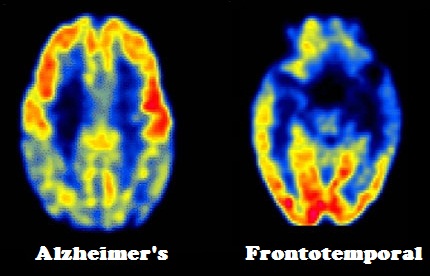
Have you heard about frontotemporal dementia ? Frontotemporal dementia is one of the less common forms of dementia.
It covers a range of specific conditions. It is sometimes called Pick’s disease of frontal lobe dementia.

The word frontotemporal refers to the two lobes of the brain that are damaged in this form of dementia. The frontal lobes of the brain situated behind the forehead – control behaviour and emotions, particularly on the right side of the brain.
They also control language, usually on the left. The temporal lobes -on either side of the brain – have many roles. On the left side, these lobes control the understanding of words.
Frontotemporal dementia is caused when nerve cells in the frontal and/or temporal lobes of the brain die and the pathways that connect them change. There is also some loss of important chemical messengers. Over time, the brain tissue in the frontal and temporal lobes shrinks.
This damage to the brain causes the typical symptoms of frontotemporal dementia, which include changes in personality and behaviour and difficulties with language.
As frontotemporal dementia is a less common form of dementia, many people (including some health professionals) may not have heard of it.
Frontotemporal dementia symptoms
There are variety of symptoms. A person who infected with this types of frontotemporal dementia ;
– Behavioral variant frontotemporal dementia
– Progressive non-fluent aphasia
– Semantic dementia
Common early symptoms may include:
• Slow, hesitant speech – speech may seem difficult to produce and a
person may stutter before they can get the right word out, or may
mispronounce it when they do
• Errors in grammar – a person may have ‘telegraphic speech’, leaving
out small link words such as ‘to’, ‘from’ or ‘the’
• Impaired understanding of complex sentences, but not single words.
As with most forms of dementia, the initial symptoms can be very subtle, but they slowly get worse as the disease progresses over several years. Therefore, they may need more care. That’s why a lot of families put their loved ones who are suffering from this disease in a memory care for seniors and high quality memory care services. If you’re looking for memory care options, you can find great dementia care here or visit sites like www.vistasimivalley.com/memory-care/.
A person with behavioural variant frontotemporal dementia may:
• Lose their inhibitions – behave in socially inappropriate ways and act in an impulsive or rash manner; this could include making tactless or inappropriate comments about someone’s appearance
• Lose interest in people and things – lose motivation but (unlike someone with depression) they are not sad
• Lose sympathy or empathy – become less responsive to the needs of others and show less social interest or personal warmth; this can make the person appear selfish and unfeeling
• Show repetitive, compulsive or ritualised behaviours – this can include repeated use of phrases or gestures, hoarding and obsessions with timekeeping
• Crave sweet or fatty foods, lose table etiquette, or binge on ‘junk’ foods, alcohol or cigarettes.
Source :- Alzheimer’s Society
Download the information about Frontotemporal Dementia Here

Leave a Reply